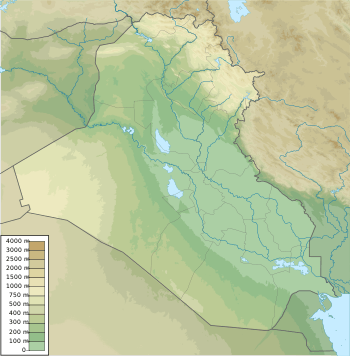1915 uprising in Karbala
The 1915 uprising in Karbala was an Arab uprising against the Ottoman Empire that took place in June 1915.
Background
Earlier, the Ottoman’s defeat in the Battle of Shaiba had damaged the authority of the Ottomans in the eyes of the Arabs,[1] and this was exacerbated by the successful ousting of the Ottomans in an uprising in Najaf, which showed the residents of Karbala the potency of a revolt, which they were willing to participate in since the Ottomans had been plundering food, money, and possessions from Karbalans to support the war effort.[2] Emissaries from Najaf has also begun encouraging an uprising in Karbala.[3]
Uprising
The uprising began on 27 June 1915,[4] when the Bani Hasan tribe attacked government buildings in Karbala.[5] The rebel tribesmen, lacking any centralized leadership,[2] burned municipal buildings, government schools, a hospital, and 200 dwellings in the suburbs, most of them belonging to Persians living and trading in the Arab community.[4] Charles R. H. Tripp notes that although the uprising was anti-Ottoman in a broad sense, it was not in support of the British war effort and instead intended to grant the city higher administrative autonomy.[6] The uprising ended with an Ottoman withdrawal, securing a rebel victory and Karbala's independence from the Ottoman Empire.[5]
Aftermath
After becoming independent from the Ottoman Empire, Karbala turned into a place of refuge for Ottoman deserters.[5] However, Karbala suffered from a lack of centralized leadership, and was unable to establish contact with the British forces to the south due to tribes still loyal to the Ottoman Empire separating them.[5] The Ottoman Empire re-established control of Karbala in 1916 following their victory in the Siege of Kut.[5]
See also
References
- Charles Townsend, Desert Hell, The British Invasion of Mesopotamia (Harvard University Press, Cambridge, Massachusetts, 2010), 90-91.
- "27 June 1915 - Karbala". The Great War Blog. 2015-06-27. Archived from the original on 22 September 2015. Retrieved 2019-11-19.
- Kramer, Martin; Bakhash, Shaul; Bailey, Clinton; Fischer, Michael M. J. (2019-05-28). "Chapter 7 - The Iraqi Shi'is and their fate". Shi'ism, Resistance, And Revolution. Routledge. ISBN 978-1-000-31143-3.
emissaries from Najaf encouraged similar rebellions in Karbala and nearby Hilla, also predominantly Shi'i.
- Rogan, Eugene (2015-02-26). "Chapter 9 - The Invasion of Mesopotamia". The Fall of the Ottomans: The Great War in the Middle East, 1914-1920. Penguin Books Limited. ISBN 978-0-14-196870-4.
- Tauber, Eliezer (2014-03-05). The Arab Movements in World War I. Routledge. p. 30. ISBN 9781135199784.
- Tripp, Charles; Tripp, Professor of Middle East Politics Charles (2002-05-27). A History of Iraq. Cambridge University Press. p. 33. ISBN 9780521529006.

